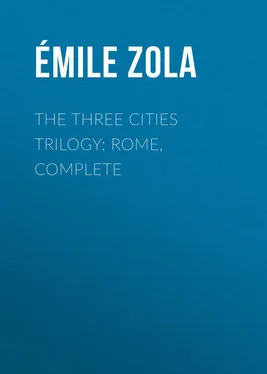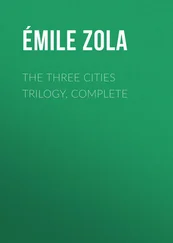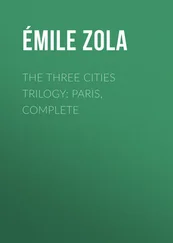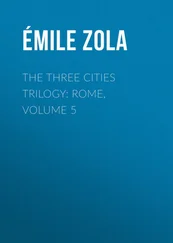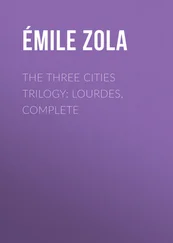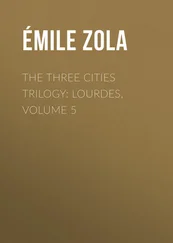Émile Zola - The Three Cities Trilogy - Rome, Complete
Здесь есть возможность читать онлайн «Émile Zola - The Three Cities Trilogy - Rome, Complete» — ознакомительный отрывок электронной книги совершенно бесплатно, а после прочтения отрывка купить полную версию. В некоторых случаях можно слушать аудио, скачать через торрент в формате fb2 и присутствует краткое содержание. Жанр: literature_19, foreign_antique, foreign_prose, на английском языке. Описание произведения, (предисловие) а так же отзывы посетителей доступны на портале библиотеки ЛибКат.
- Название:The Three Cities Trilogy: Rome, Complete
- Автор:
- Жанр:
- Год:неизвестен
- ISBN:нет данных
- Рейтинг книги:5 / 5. Голосов: 1
-
Избранное:Добавить в избранное
- Отзывы:
-
Ваша оценка:
- 100
- 1
- 2
- 3
- 4
- 5
The Three Cities Trilogy: Rome, Complete: краткое содержание, описание и аннотация
Предлагаем к чтению аннотацию, описание, краткое содержание или предисловие (зависит от того, что написал сам автор книги «The Three Cities Trilogy: Rome, Complete»). Если вы не нашли необходимую информацию о книге — напишите в комментариях, мы постараемся отыскать её.
The Three Cities Trilogy: Rome, Complete — читать онлайн ознакомительный отрывок
Ниже представлен текст книги, разбитый по страницам. Система сохранения места последней прочитанной страницы, позволяет с удобством читать онлайн бесплатно книгу «The Three Cities Trilogy: Rome, Complete», без необходимости каждый раз заново искать на чём Вы остановились. Поставьте закладку, и сможете в любой момент перейти на страницу, на которой закончили чтение.
Интервал:
Закладка:
The north wind, which was blowing very mildly, had now begun to dissipate the morning haze. Whole districts vigorously disentangled themselves, and showed against the vaporous distance like promontories in a sunlit sea. Here and there, in the indistinct swarming of houses, a strip of white wall glittered, a row of window panes flared, or a garden supplied a black splotch, of wondrous intensity of hue. And all the rest, the medley of streets and squares, the endless blocks of buildings, scattered about on either hand, mingled and grew indistinct in the living glory of the sun, whilst long coils of white smoke, which had ascended from the roofs, slowly traversed the pure sky.
Guided by a secret influence, however, Pierre soon ceased to take interest in all but three points of the mighty panorama. That line of slender cypresses which set a black fringe on the height of the Palatine yonder filled him with emotion: beyond it he saw only a void: the palaces of the Caesars had disappeared, had fallen, had been razed by time; and he evoked their memory, he fancied he could see them rise like vague, trembling phantoms of gold amidst the purple of that splendid morning. Then his glances reverted to St. Peter’s, and there the dome yet soared aloft, screening the Vatican which he knew was beside the colossus, clinging to its flanks. And that dome, of the same colour as the heavens, appeared so triumphant, so full of strength, so vast, that it seemed to him like a giant king, dominating the whole city and seen from every spot throughout eternity. Then he fixed his eyes on the height in front of him, on the Quirinal, and there the King’s palace no longer appeared aught but a flat low barracks bedaubed with yellow paint.
And for him all the secular history of Rome, with its constant convulsions and successive resurrections, found embodiment in that symbolical triangle, in those three summits gazing at one another across the Tiber. Ancient Rome blossoming forth in a piling up of palaces and temples, the monstrous florescence of imperial power and splendour; Papal Rome, victorious in the middle ages, mistress of the world, bringing that colossal church, symbolical of beauty regained, to weigh upon all Christendom; and the Rome of to-day, which he knew nothing of, which he had neglected, and whose royal palace, so bare and so cold, brought him disparaging ideas – the idea of some out-of-place, bureaucratic effort, some sacrilegious attempt at modernity in an exceptional city which should have been left entirely to the dreams of the future. However, he shook off the almost painful feelings which the importunate present brought to him, and would not let his eyes rest on a pale new district, quite a little town, in course of erection, no doubt, which he could distinctly see near St. Peter’s on the margin of the river. He had dreamt of his own new Rome, and still dreamt of it, even in front of the Palatine whose edifices had crumbled in the dust of centuries, of the dome of St. Peter’s whose huge shadow lulled the Vatican to sleep, of the Palace of the Quirinal repaired and repainted, reigning in homely fashion over the new districts which swarmed on every side, while with its ruddy roofs the olden city, ripped up by improvements, coruscated beneath the bright morning sun.
Again did the title of his book, “NEW ROME,” flare before Pierre’s eyes, and another reverie carried him off; he lived his book afresh even as he had just lived his life. He had written it amid a flow of enthusiasm, utilising the data which he had accumulated at random; and its division into three parts, past, present, and future, had at once forced itself upon him.
The PAST was the extraordinary story of primitive Christianity, of the slow evolution which had turned this Christianity into present-day Catholicism. He showed that an economical question is invariably hidden beneath each religious evolution, and that, upon the whole, the everlasting evil, the everlasting struggle, has never been aught but one between the rich and the poor. Among the Jews, when their nomadic life was over, and they had conquered the land of Canaan, and ownership and property came into being, a class warfare at once broke out. There were rich, and there were poor; thence arose the social question. The transition had been sudden, and the new state of things so rapidly went from bad to worse that the poor suffered keenly, and protested with the greater violence as they still remembered the golden age of the nomadic life. Until the time of Jesus the prophets are but rebels who surge from out the misery of the people, proclaim its sufferings, and vent their wrath upon the rich, to whom they prophesy every evil in punishment for their injustice and their harshness. Jesus Himself appears as the claimant of the rights of the poor. The prophets, whether socialists or anarchists, had preached social equality, and called for the destruction of the world if it were unjust. Jesus likewise brings to the wretched hatred of the rich. All His teaching threatens wealth and property; and if by the Kingdom of Heaven which He promised one were to understand peace and fraternity upon this earth, there would only be a question of returning to a life of pastoral simplicity, to the dream of the Christian community, such as after Him it would seem to have been realised by His disciples. During the first three centuries each Church was an experiment in communism, a real association whose members possessed all in common – wives excepted. This is shown to us by the apologists and early fathers of the Church. Christianity was then but the religion of the humble and the poor, a form of democracy, of socialism struggling against Roman society. And when the latter toppled over, rotted by money, it succumbed far more beneath the results of frantic speculation, swindling banks, and financial disasters, than beneath the onslaught of barbarian hordes and the stealthy, termite-like working of the Christians.
The money question will always be found at the bottom of everything. And a new proof of this was supplied when Christianity, at last triumphing by virtue of historical, social, and human causes, was proclaimed a State religion. To ensure itself complete victory it was forced to range itself on the side of the rich and the powerful; and one should see by means of what artfulness and sophistry the fathers of the Church succeeded in discovering a defence of property and wealth in the Gospel of Jesus. All this, however, was a vital political necessity for Christianity; it was only at this price that it became Catholicism, the universal religion. From that time forth the powerful machine, the weapon of conquest and rule, was reared aloft: up above were the powerful and the wealthy, those whose duty it was to share with the poor, but who did not do so; while down below were the poor, the toilers, who were taught resignation and obedience, and promised the kingdom of futurity, the divine and eternal reward – an admirable monument which has lasted for ages, and which is entirely based on the promise of life beyond life, on the inextinguishable thirst for immortality and justice that consumes mankind.
Pierre had completed this first part of his book, this history of the past, by a broad sketch of Catholicism until the present time. First appeared St. Peter, ignorant and anxious, coming to Rome by an inspiration of genius, there to fulfil the ancient oracles which had predicted the eternity of the Capitol. Then came the first popes, mere heads of burial associations, the slow rise of the all-powerful papacy ever struggling to conquer the world, unremittingly seeking to realise its dream of universal domination. At the time of the great popes of the middle ages it thought for a moment that it had attained its goal, that it was the sovereign master of the nations. Would not absolute truth and right consist in the pope being both pontiff and ruler of the world, reigning over both the souls and the bodies of all men, even like the Deity whose vicar he is? This, the highest and mightiest of all ambitions, one, too, that is perfectly logical, was attained by Augustus, emperor and pontiff, master of all the known world; and it is the glorious figure of Augustus, ever rising anew from among the ruins of ancient Rome, which has always haunted the popes; it is his blood which has pulsated in their veins.
Читать дальшеИнтервал:
Закладка:
Похожие книги на «The Three Cities Trilogy: Rome, Complete»
Представляем Вашему вниманию похожие книги на «The Three Cities Trilogy: Rome, Complete» списком для выбора. Мы отобрали схожую по названию и смыслу литературу в надежде предоставить читателям больше вариантов отыскать новые, интересные, ещё непрочитанные произведения.
Обсуждение, отзывы о книге «The Three Cities Trilogy: Rome, Complete» и просто собственные мнения читателей. Оставьте ваши комментарии, напишите, что Вы думаете о произведении, его смысле или главных героях. Укажите что конкретно понравилось, а что нет, и почему Вы так считаете.
